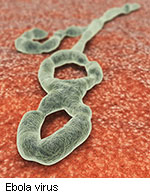
WEDNESDAY, Jan. 21, 2015 (HealthDay News) — New animal research suggests why Ebola becomes more deadly as it spreads.
Investigators tracked the Zaire Ebola strain, the virus circulating in the West African outbreak, as it spread among laboratory animals. The first animals to be infected were not affected by the virus, but it became more lethal as it spread to other animals.
By analyzing the virus at different stages, the British scientists identified several genetic changes that made Ebola more deadly as it spread.
“The work tells us that the evolutionary goal of Ebola virus is to become more lethal,” study co-author Julian Hiscox, of the University of Liverpool Institute of Infection and Global Health, said in a university news release.
“We were able to show through genetic analysis which parts of the virus are involved in this process. The information we have gathered will now allow us to monitor for such changes in an outbreak, as well as develop future treatment strategies.”
The study was published Jan. 21 in the journal Genome Biology.
“Ebola virus is such a devastating infection to the people affected by the disease and the economy of West Africa,” study co-author Roger Hewson, of Public Health England, said in the news release.
Yet, current “understanding of Ebola virus biology is way behind that of other viruses,” Hewson added.
In the West African outbreak, Guinea, Liberia and Sierra Leone have been the three nations hardest hit by Ebola. There have been more than 21,000 infections and more than 8,400 deaths reported since the outbreak began last spring.
More information
The U.S. Centers for Disease Control and Prevention has more about Ebola.
Copyright © 2024 HealthDay. All rights reserved.

